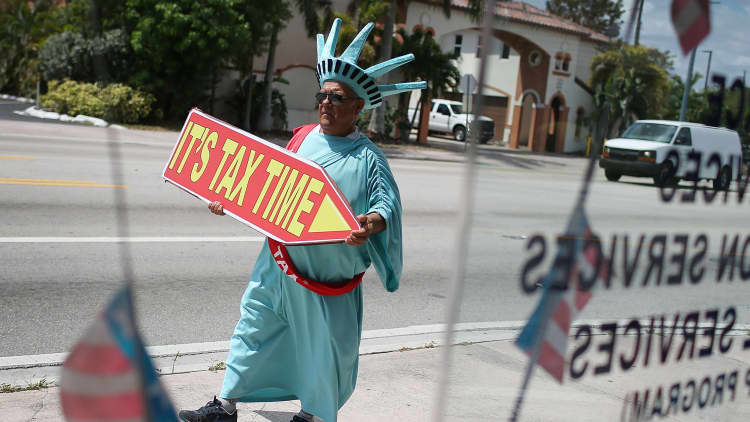2018 taxes are due on April 15 and, though everyone's tax situation is different, you could face real consequences if you don't submit your return by the deadline. Here's what you need to know.
There's a difference between not filing and not paying
There are different penalties for not filing your taxes and not paying them, says Bill Smith, managing director of CBIZ MHM's National Tax Office. "The failure-to-file penalty is much worse," he notes.
If you don't file, the failure-to-file penalty is 5% of your unpaid taxes for each month your tax return is late, up to 25%. The penalty starts accruing the day after the tax deadline. If you file more than 60 days late, you'll pay a minimum of $135 or 100% of the taxes you owe (whichever is less).
If you file your taxes but don't pay them, the IRS can charge you a failure-to-pay penalty. The penalty is far less: Generally, the IRS will charge you 0.5% of your unpaid taxes for each month you don't pay, up to 25%.
Interest also accrues on your unpaid taxes. The interest rate is equal to the federal short-term rate, plus 3%.
If both penalties "are running concurrently, the total per month cannot exceed 5%," Smith notes.
Penalties only come into play if you owe the IRS, says Smith: "Both penalties are a function of the amount of tax owed. So if you are entitled to a refund there will be no penalties. Just make sure you file within three years or the IRS is no longer required to pay you your refund."

You can file an extension
If you don't have all of the tax documents necessary to file your return by April 15, or you don't think you'll have time to finish it up on time, you can request an extension, which gives you an extra six months, until Oct. 15, to file.
Filling out IRS Form 4868, the application for an extension, is very simple, says Smith: "You can do it electronically or you can print a form off the IRS website. It's not much more than your name, address, Social Security number and how much you think you're going to owe when you file. It's an automatic six-month extension."
The key is estimating your tax liability for 2018, and if you owe anything, paying at least some of it when you file the extension. After all, "Form 4868 doesn't extend the time to pay taxes," the IRS site notes. "If you don't pay the amount due by the regular due date, you'll owe interest. You may also be charged penalties."
File even if you can't pay, experts say
Even if you can't pay your taxes, it's still important to file, Smith says: "You need to either file by April 15, or file an extension by April 15."
If you don't file, the consequences can pile up, thanks to fees and interest. Plus, you may miss out on a refund.
Say you owe $10,000 in taxes, don't file for an extension and pay on Oct.15, says Smith: "By not filing for an extension, you have a 5% per month penalty for failure to file (25% total or $2,500 through Sept. 15) and a 0.5% failure-to-pay penalty for October (or $50). Had you filed an extension request, the penalty would have been six months at 0.5%, or $300."
If you end up owing money and can't afford to pay it, you can always apply for a payment plan with the IRS to resolve your tax debt.
If you haven't done so already, finish up your return or at least file an extension by April 15, says Smith: "Most of you are probably entitled to a refund, so don't let the government hold your money for free."
Don't miss: Only 25 percent of Americans know this effective tax-saving strategy is legal
Like this story? Subscribe to CNBC Make It on YouTube!




